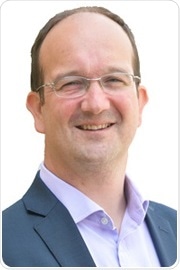There are a number of challenges, but primarily, it's access to funding. The recent BioCap Conference focussed on the access small businesses have to funding and how that's driven by changes in the market place. As we all know, the Blockbuster model is broken in Big Pharma. They're looking for small, more niche products now and they're obviously a bit more risk-averse, as are investors.
 Romolo Tavani | Shutterstock
Romolo Tavani | Shutterstock
Investors generally find it difficult to understand this sector and assess risk profiles, so companies struggle to raise the finance they need and reach a point where they become attractive to major investors. I’m not blaming the investors though, companies in the sector must take more responsibility for effectively communicating with investors to bridge this divide and allow them to understand the opportunity and assess the level of risk.
How important is innovation in these sectors?
It's vital – the lifeblood of the sector. The UK is very strong at biomedical innovation and is second only to the US.
The North is a particularly good place to base a sector on innovation. The N8 universities work very closely together and we work very closely with them.
Also, large company spinouts and businesses that are coming out of those organizations are a source of innovation. We support that innovation – that interface between large companies, universities, and the small and medium-sized businesses.
Please can you give a brief introduction to Bionow?
We're a membership organization in the biomedical or life science industry, which includes everything from pharmaceuticals through biotech, analytics, diagnostics, and medical devices.
We focus on the North of England, and our membership base ranges from very small businesses all the way through to large corporates and whilst most are in the North we have members right across the UK
Our corporate patron is AstraZeneca, but the vast majority of our members are small and medium-sized businesses. We have a range of benefits for companies that are at different stages of development, from start-up through development, into clinical trials and beyond into the market.
The benefits range from savings on the cost of lab equipment and consumables, through to insurance, recruitment, training, networking, support and events (both regional and national) such as BioCap, which looks at funding. We also look at specialist events like Bioinfect, which is focused on new antimicrobials and is in its second year of running.
Why was Bionow formed and how has it grown since its inception?
It was originally part of what was called the Northwest Development Agency, a regional development agency. It was established in 2000 as a support mechanism, but with the purpose of directing investment into the sector.
In 2011, when the regional development agencies were abolished, we wrote a business plan based very much around supporting businesses through a range of benefits. We took that to businesses across the sector and asked them if it looked attractive to them: they said it did.
Three of us started the business because we feel that market failure provides a real opportunity for an organization to support the community and bring it together.
We do this in a number of ways, making introductions and acting as the glue that brings it all together and maintain an active and tangible network. We support the community and as a not-for-profit organization, we're very much here for the good of the community and the good of the sector.
I'm sure it might extend over the years, but we mainly cover the North, areas such as Liverpool, Manchester, Sheffield, Leeds, York, Newcastle, and Durham. The Midlands is a potential area we might look to expand our support network to.
We also have a lot of members in North Wales, which is a real focus for us because they're very attached economically to Liverpool and Northwest England rather than South Wales.
Who are Bionow’s core members and how do you support them?
We split our members into core and non-core companies. In the North, there’s about a thousand companies in this sector. About fifty percent are core, so they are conducting research and development or are manufacturing companies, while the other half are specialist service providers.
In terms of support for the core members, we provide money saving opportunities in areas such as purchasing, recruitment and insurance. We can show them how they can save more than their membership fee.
Support for both core and non-core companies is provided through the network and promotional side of things such as events and the Bionow directory. We have an online business-to-business (B2B) platform and really try to drive interaction between the core and non-core companies.
We think our members should have easy access to the right expertise at the right time and not necessarily have to reinvent the wheel every time. Through the network, we can help them make the right contacts and shorten the time to market, while ensuring their overall strategy is de-risked.
We cover a big geographical area and pack quite a punch when you consider that there are only six of us. We achieve a lot by using virtual online services and we work with a lot of good partners and suppliers. We're in the middle of bringing users together with providers and sometimes companies can even become both a user and a provider. That's the ethos of what we do.
Can you please give an overview of the recent BioCap Conference?
It's the third year we've run BioCap and it was established to try and drive greater visibility and interaction between companies in the North and investors, who are primarily in the South or overseas in other parts of the world.
This year, much of our focus was on attracting international and national investors. I hope that the businesses made use of that and made the contacts they need. We had about 170 delegates, which is about the same as last year, although it was much more investment focussed this year and there were a lot more core companies present.
We had fourteen companies pitching for investment. We had to extend that because the competition was so oversubscribed and hopefully they've made progress there too.
There were also international VCs such as Silicon Valley Bank, as well as a broad range of sector investors such as Albion Ventures, Epidarex Capital and Takeda to name just a few. We attracted people like John Moulton from Better Capital who is an extremely well-known figure in the city who gave a spirited keynote address.
We think BioCap is really starting to build that interaction between the businesses and the VC community. We'll continue to do that and we're going to run this next year (at Alderley Park). We'll be doing more partnering to really drive that interaction and give companies the leg up they need.
What do you think the future holds for the North of England life science cluster and how do Bionow plan to add to this?
Bionow is growing and we believe it will continue to grow. We monitor the growth of the cluster regularly and it’s growing significantly. We think we can support that, as our membership has also been growing year on year and the market is improving from a funding perspective.
Hopefully businesses will be able to access that funding, which would enable them to benefit from what we are doing and come together more effectively. Our focus is on growing the membership and taking it to more people.
I think the key thing for us is to keep the universities engaged and help leverage their capabilities because it’s part of their agenda to engage with the small and medium-sized enterprises. They believe that we can do that and we now have seven universities who are supporters. We may break into the NHS at some stage as well and benefit from the support that they can give. We see the future as bright.
Where can readers find more information?
The main place is the website (http://www.bionow.co.uk/home.aspx) and there’s also a monthly newsletter that can be accessed there (without being a member) which is useful for finding out what’s happening in the sector. We are also on Twitter and LinkedIn.
About Dr. Geoff Davison
 Geoff is Chief Executive of Bionow having founded the business in 2011 to further represent the interests of the Northern biomedical cluster and enable Bionow members to be the most productive and competitive in the world. Having led the business through establishment his current focus is on the strategic aim for Bionow to be the leading biomedical membership organisation in terms of reputation, service and impact. Geoff has overall responsibility for all aspects of the Bionow business. Bionow now has 230 subscribing members including start-ups and early stage firms as well as established growth-oriented companies, across the North of England and further afield.
Geoff is Chief Executive of Bionow having founded the business in 2011 to further represent the interests of the Northern biomedical cluster and enable Bionow members to be the most productive and competitive in the world. Having led the business through establishment his current focus is on the strategic aim for Bionow to be the leading biomedical membership organisation in terms of reputation, service and impact. Geoff has overall responsibility for all aspects of the Bionow business. Bionow now has 230 subscribing members including start-ups and early stage firms as well as established growth-oriented companies, across the North of England and further afield.
Geoff originally joined the Bionow team in July 2007 when Bionow was part of the Northwest Regional Development Agency (NWDA) progressing to Biomedical Sector Head in 2009 where he was responsible forstrategic company engagement, foreign direct investment activities and public investment in strategic projects.
Prior to Bionow, Geoff was founder and Technical Director of Biorite Ltd and Advanced Biomedical Ltd both spin-out companies from the University of Manchester. He is currently a Board Member of the Academy of Pharmaceutical Sciences a member of the MIMIT investment committee and previously a Board member of the UKTI Life Sciences Marketing Board. Geoff is regularly invited to advise on industry requirements and represent the Bionow membership both regionally and nationally. Geoff has a degree in Biochemistry and a PhD from the School of Pharmacy, University of Manchester where he began his career undertaking postdoctoral research.